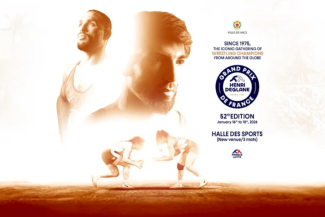Wrestling's Niamkey Named Chair of ASOIF Sports Development and Education Group
Wednesday, May 29, 2019 - 19:26 By United World Wrestling Press

Experts from 28 International Federations (IFs) governing summer and winter Olympic sports and representatives from the International Olympic Committee (IOC) gathered this week at the seventh edition of ASOIF’s Sports Development and Education Forum (ASDEG Forum). The event was held on 28 and 29 May 2019 at the International Basketball Federation (FIBA) headquarters in Mies, Switzerland, led by the ASOIF’s ASDEG Consultative Group.
The group shared best practices of their e-learning programmes for education of anti-doping, pathway to international competitions and athlete’s safeguarding and welfare. The International Judo Federation and International Tennis Federation provided updates of their online academies which offered extensive online resources to educate and support their athletes and coaches. The IFs also exchanged thoughts of how to help their National Federations (NFs) grow into their sports. The FIBA presented its dedicated project to transfer knowledge and optimise investment to the NFs.
With the Tokyo 2020 Olympic Games on the horizon, the International Hockey Federation shared its approach to ensure a legacy for next year’s Games. The group explored a collective action plan to be implemented in this regard with close cooperation between the IOC, ASOIF and IFs. In view of the Youth Olympic Games 2022 to be held in Dakar, Senegal, a representative from OlympAfrica Foundation attended the meeting to share their activities of youth and grassroots development in African countries and proposed practical solutions to tackle logistic issues within Africa.
Organised annually, the forum facilitates a united approach of a large number of IFs in the implementation of their projects in the fields of development and education. This allows efficiencies in terms of human and financial resources, ensures a certain consistency across the sports and thereby maximises the impact of the related IF activities overall.
The newly appointed ASDEG Chair Deqa Niamkey, UWW Development Director said on the occasion of the Forum: “I am very pleased and happy to be appointed as the Chair of the ASDEG Consultative Group. The Forum has taken the direction I always anticipated, providing a unique opportunity for the IFs to network, exchange ideas and share best practices of their development activities.”
The forum also provided for productive exchanges about defining and quantifying development and progress achieved since the last meeting. A representative from Olympic Solidarity joined in to give an update on their current activities and discuss new project ideas.
About the ASOIF Sports Development and Education Group (ASDEG)
The ASDEG was created in 2012 and is responsible for giving expert advice in the area of Sports Development and Education. The group meets twice a year and organises an annual forum for all ASOIF member IFs to coordinate their approaches and share knowledge in sports development and education.
The next ASDEG Forum is foreseen for May 2020.


Share your thoughts.
Comments